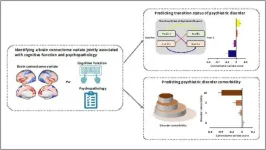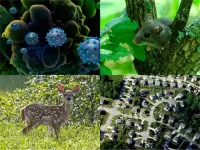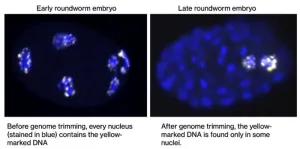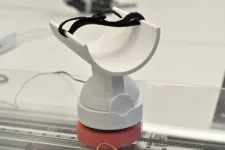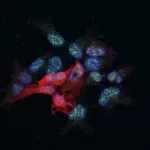(Press-News.org) An international group of 35 scientists is calling out conflicts of interest plaguing global plastic treaty negotiations and that have interfered with timely action on other health and environmental issues. They urge the implementation of strict guidelines to prevent the same problems from affecting the UN’s upcoming Science Policy Panel on chemicals. Their concerns and recommendations are outlined in a featured paper in the journal Environmental Science & Technology.
“From Big Tobacco to Big Oil, powerful industries use the same playbook to manufacture doubt and sow misinformation,” said co-author Bethanie Carney Almroth, a Professor at the Department of Biological and Environmental Sciences, University of Gothenburg. “The plastic and chemical industries already have a long history of deploying these tactics to hamper regulatory efforts. Our health and that of the planet upon which we rely, can’t afford any further subversion of efforts to reduce the widespread contamination of our air and water.”
The group’s warning comes as countries prepare to meet next week for the third UN plastic treaty negotiation session in Nairobi. Though scientists had advised against it, the plastic and petrochemical industries were actively involved in the first round of negotiations in 2022. The paper notes that industry representatives pushed misleading statements, including the debunked claim that plastic production will help fight climate change. To date, no action has been taken to curb these conflicts of interest.
The scientists express concern that similar issues could arise in the development of the UN Science Policy Panel on chemicals, waste, and pollution. The UN Environment Assembly decided in 2022 to establish this Panel to support countries in their efforts to protect human and ecosystem health through scientific assessments. As the working group to create the Panel will meet Dec. 11-15, today’s paper is a call to protect its work from undue influence by companies with a vested interest in revenue-generating chemicals.
“Letting polluters have a say in pollution protections is the epitome of the fox guarding the henhouse,” said lead author Andreas Schäffer, a Professor at the Institute for Environmental Research, RWTH Aachen University. “Just like the tobacco industry was restricted from WHO’s work on smoking, the UN shouldn’t let the chemical industry’s hired guns dilute global guidelines for chemical and waste management.”
The participation of industry in a UN intergovernmental science-policy body would not be unprecedented. For example, fossil fuel representatives co-authored major reports of the Intergovernmental Panel on Climate Change, the Science Policy’s Panel analogue for climate.
To ensure the effectiveness of the Science Policy Panel, the scientists who co-authored the paper issue the following key recommendations that should be incorporated into the process:
Define clear and strict conflict of interest provisions.
Do not confuse the undesirable conflicts of financial or political competing interests with legitimate interests or biases.
Install regular audits of the Panel’s work to check for conflict of interest.
Secure as many elements of transparency as possible.
END
Scientists flag conflicts of interest ahead of UN plastic and chemical talks
2023-11-09
ELSE PRESS RELEASES FROM THIS DATE:
First-ever crowd-sourced small molecule discovery and a potent SARS-CoV-2 antiviral lead compound announced by COVID Moonshot Consortium
2023-11-09
The work of the COVID Moonshot Consortium is being published in the prestigious journal Science on 10 November, revealing their discovery of a potent SARS-CoV-2 antiviral lead compound. It also reflects on the success of its open science approach in launching a patent-free antiviral discovery program to rapidly develop a differentiated lead in response to a pandemic emergency. Open science discovery of potent noncovalent SARS-CoV-2 main protease inhibitors ) DOI 10.1126/science.abo7201.
The COVID Moonshot initiative ...
Cornell chemists image basic blocks of synthetic polymers
2023-11-09
ITHACA, N.Y. -- Synthetic polymers are everywhere in our society – from nylon and polyester clothing to Teflon cookware and epoxy glue. At the molecular level, these polymers’ molecules are made of long chains of monomer building blocks, the complexity of which increases functionality in many such materials.
In particular, copolymers, which consist of different types of monomers in the same chain, allow for fine-tuning of the material’s properties, said Peng Chen, the Peter J.W. Debye Professor of Chemistry in the College of Arts and Sciences (A&S). The monomer sequence plays a critical role in a material’s properties, but scientists until ...
Brain imaging identifies biomarkers of mental illness
2023-11-09
Philadelphia, November 9, 2023 – Research and treatment of psychiatric disorders are stymied by a lack of biomarkers – objective biological or physiological markers that can help diagnose, track, predict, and treat diseases. In a new study, researchers use a very large dataset to identify predictive brain imaging-based biomarkers of mental illness in adolescents. The work appears in Biological Psychiatry, published by Elsevier.
Traditionally, psychiatric disorders such as depression have been diagnosed based on symptoms according to subjective assessments. The identification of biomarkers to aid in diagnosis and treatment selection would greatly advance treatments.
In ...
Cary Institute partners on $3M USDA-funded study on COVID-19 variants that could emerge from wildlife
2023-11-09
Many wild animals can carry COVID-19, including those that live among us, such as deer mice, red foxes, white-tailed deer, and more. These species may act as reservoirs, offering new opportunities for the virus to mutate and spill back into people. The omicron variant, for example, is thought to have emerged from mice.
With $3 million in federal grant funding, a new five-year research project will bring together virology, disease ecology, and artificial intelligence to better understand how SARS-CoV-2 (the virus that causes COVID-19) behaves ...
The enigma of embryonic development: How certain animals trim their genomes
2023-11-09
New research is underway to decipher a fascinating biological puzzle—how some animals can naturally discard more than half of their genetic information during embryonic development.
This radical natural phenomenon has captivated scientists for over 130 years, presenting a tantalizing question in the field of developmental biology and genetics.
Equipped with the latest in genetic engineering tools, the team at The University of Warwick is working to dissect the mechanisms behind this selective genomic editing. By uncovering the processes that allow some nematode worms to abandon up to ...
New URI lab developing adaptive technology, secures National Science Foundation grant
2023-11-09
New URI lab developing adaptive technology, secures National Science Foundation grant
Reza Abiri and Yalda Shahriari receive National Science Foundation award totaling $460,000 for work to improve stroke patient rehabilitation
Passing by Reza Abiri’s office at the University of Rhode Island, one might suspect him of nursing a serious coffee habit. A colorful collection of various mugs and cups dot his office, and though he is friendly enough to likely welcome any visitors stopping by to chat, the cups serve a larger purpose.
Abiri and Yalda Shahriari, professors in ...
MD Anderson announces Institute for Data Science in Oncology to advance mission to end cancer
2023-11-09
HOUSTON ― The University of Texas MD Anderson Cancer Center today announced the launch of its Institute for Data Science in Oncology (IDSO), which integrates the most advanced computational and data science approaches with the institution’s extensive scientific and clinical expertise to significantly improve patient’s lives by transforming cancer care and research.
Bringing top data scientists from a variety of fields together with clinicians and cancer scientists, the institute builds on MD Anderson’s culture of collaboration and connectivity to tackle the field’s most pressing needs in new and innovative ways. IDSO’s efforts have been catalyzed by philanthropic ...
Researchers decipher the mechanism by which the MAF protein promotes breast cancer metastasis
2023-11-09
The MAF protein interacts with the estrogen receptor, alters its function, and promotes the spread of cancer.
The KDM1A enzyme plays a fundamental role in the epigenetic remodelling that facilitates the function of pro-metastatic genes.
The work carried out in Dr. Roger Gomis Lab at IRB Barcelona has been published in the journal Nature Cell Biology.
Barcelona, 9 November 2023 – Breast cancer is the most common form of cancer among women, with more than 2 million new cases diagnosed each year. In cases where the tumour remains localised in the breast, survival rates are remarkably high, ...
New research: Fivefold increase in the melting of Greenland's glaciers over the last 20 years
2023-11-09
New research: Fivefold increase in the melting of Greenland's glaciers over the last 20 years
In the largest survey of its kind ever conducted, using both satellite imagery and old aerial photos from the Danish National Archives, researchers from the University of Copenhagen firmly establish that Greenland’s glaciers are melting at an unprecedented pace. Melting has increased fivefold in the past 20 years. The study eliminates any lingering doubts about the impact of climate change on Greenland's more than 20,000 glaciers.
Based on the most comprehensive monitoring ...
Drug screen points toward novel diabetes treatments
2023-11-09
A drug currently in clinical trials as a cancer therapy can also stimulate pancreatic beta cells to secrete insulin, revealing a previously unknown mechanism for insulin regulation in type 2 diabetes, according to a new study by Weill Cornell Medicine investigators. The preclinical discovery, reported Nov. 9 in Nature Chemical Biology, provides a new chemical tool for probing the biology of diabetes, and could point the way toward better treatments for the disease.
“We have known about insulin for a century, but when it comes to the major mechanisms controlling insulin secretion, there ...

